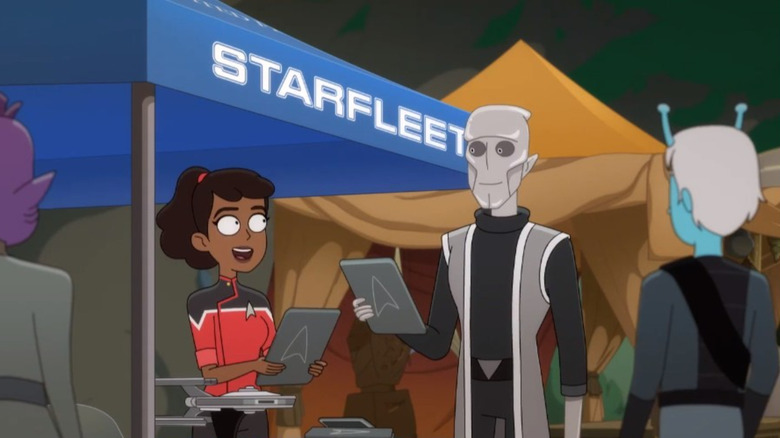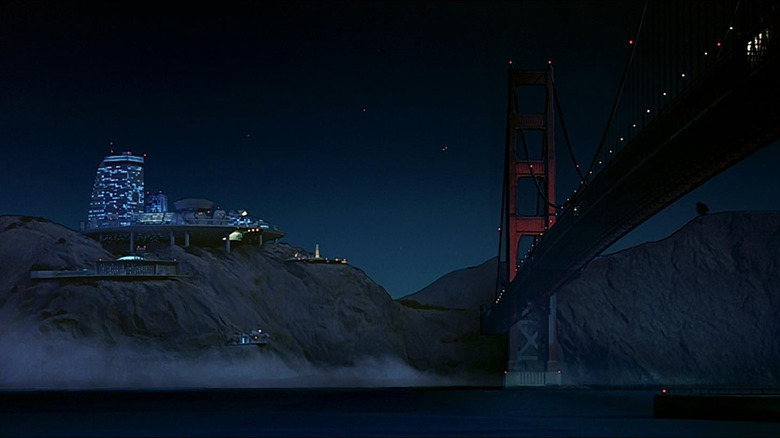Star Trek: Lower Decks Season 3 Interrogates The Very Purpose Of Starfleet
In "Reflections," the fifth episode of the third season of "Star Trek: Lower Decks," Ensigns Boimler (Jack Quaid) and Mariner (Tawney Newsome) have been assigned to work the Starfleet booth at what is essentially the "Star Trek" version of a college jobs fair. As anyone who has ever attended a jobs fair (or anyone who has ever had the bad luck of working in one of those 10-foot-by-10-foot sunshade tents) knows, the experience can be miserable. Working a booth entails performing a series of dry sales pitches for only vaguely interested passersby, hoping that maybe one person in every 50 will write their e-mail address on your clipboard. One hopes they haven't just stopped at your booth for your bowl of free York Peppermint Patties.
While it may seem logical that Starfleet would have recruiting booths at jobs fairs, Trekkies watching may experience a slight pang of cognitive dissonance. Why, after all, would Starfleet need to recruit people? Almost all of the "Star Trek" shows to date ("Picard" notwithstanding) have been about the crew of a starship or space station going about their jobs exploring the galaxy, rescuing imperiled scientists, and being generally diplomatic. "Star Trek," in both presentation and in plain dialogue, showcases a career in Starfleet as one of the galaxy's most vaunted professions.
Occasionally, "Star Trek" would encounter a species that criticized Starfleet, but, at best, those complaints reeked of a smug resentment coming from aliens who clearly weren't as well-assembled or efficient or noble as Starfleet. It wouldn't be until "Star Trek: Deep Space Nine" in 1993 that Trekkies would spend a more meaningful amount of time with species outside of the Federation, and finally begin to accept that Starfleet may only be one of many possible options.
Criticizing Starfleet
Because the universe of "Star Trek" hovers around Starfleet and the Federation, actual on-screen criticism of the organizations are rare. A few complaints came from outsiders — Starfleet is often too eager to "share" technology, for instance, leaving some fearful of their tendency to take — but at the end of the day, the organization itself was never depicted as being wrong or even all that flawed. As the years passed, however, fans and critics began to analyze shows like "Star Trek: The Next Generation" more deeply, pointing out that Starfleet is perhaps a little too militaristic and a little too stiffly bureaucratic to be anything more than representing bland devotion to a distantly colonialist status quo. On that show Wesley Crusher (Wil Wheaton) represented the youth of the future, and the youth were all boring, well-behaved geniuses who wanted nothing more than to do their homework and give their lives over to a career Starfleet.
In "Reflections," a pair of Starfleet ensigns are finally confronted, quite directly, with some of Starfleet's less attractive aspects. For one, the work can suck. That's been the central joke of "Lower Decks" from the start. Two, there are far sexier professions in the "Star Trek" universe. The booth next to the Starfleet booth contains a Lara Croft-like (or rather, Vash-esque) tomb-raiding archeologist who offers takers a life of plunder and adventure. There are those who sell board games. There are collectors who offer rare, fascinating wares. There's even a booth of Trek Truthers, who question the events of older episodes.
Thanks to the jeering coming from neighboring booths, Ensign Boimler has to defend Starfleet from the now-accusatory visitors. His final defense is an explosion of temper rarely seen from otherwise-composed Starfleet personnel.
'We just want to study f****** quasars!'
In the episode's climax, Boimler flips tables and begins wailing in frustration that, well, Starfleet is right. He points out to all his neighbors that his devotion to Slarfleet is not a mindless adherence to some abstract patriotic ideal, but a well-considered belief that what Starfleet does is useful and helpful. A traveling scientist — previously smug about his ability to wear whatever he wanted — is told that Starfleet doesn't want to stage rescue missions, but "study f****** quasars!" But, Boimler screams, rescuing people is the right thing to do! He points out to the collectors that the steady acquisition of objects is not a healthy obsession and that it won't fulfill their lives (This, of course, is a rich message coming from a media franchise that is, itself, lousy with merch). The Trek Truthers are told they're weirdos, and the game sellers are always getting people trapped inside games. Stop that!
Comedically, Boimler's outburst attracts a few signatures. Onlookers are impressed with his confidence.
Although they are only slight examples screamed in a tantrum of frustration, Boimler is, in fact, getting at something somewhat profound. Starfleet, for all its militaristic trappings and presumed colonialist aesthetic, is, in fact, a moral organization. Starfleet helps people because it's the right thing to do. Indeed, while may interpret the power and wherewithal of Starfleet as a smug gesture to flaunt their status in the galaxy, Starfleet has most often been a peacekeeping organization devoted to peace and unity.
The purpose of Starfleet
There are, of course, myriad criticisms that one could level at the Federation and at Starfleet. For one, in their slavish devotion to Boldly Going Where No One Has Gone Before, Starfleet can often fail to follow up on things. On "Lower Decks," set a good century after the events of the original series, Starfleet was finally seen following up on a civilization they liberated from a malevolent computer decades before.
For another, Starfleet also represents a set of moral and ethical values that aren't necessarily shared by everyone in the galaxy, or even everyone in the organization. If a pre-warp society is dying of a plague that the Enterprise can cure, Starfleet ethics dictate that the people remain unaided, left to their own devices when it comes to their own fate. This, of course, goes into compicated questions on the "Star Trek" Prime Directive, itself an anti-colonialist measure.
Starfleet values togetherness and cooperation and diplomacy, but also demands from its officers a very specific code of conduct. And their code of conduct is very conservative, requiring uniforms, a respect for a military rank, following orders, and trust in the system. Starfleet officers don't have alcohol on their ships, but booze-free synthehol. Even fraternization appears to be seen as unprofessional. Starfleet is, then, a contradiction. It's an organization that encourages multiculturalism and welcomes outside viewpoints and intelligent interjections, but they require it under military auspices.
There are many other ways in which Starfleet can be criticized as well. But Boimler, in a moment of anger, keeps the more positive aspects of Starfleet in mind. They don't want to flaunt their status. They are merely moved to do the right thing.



